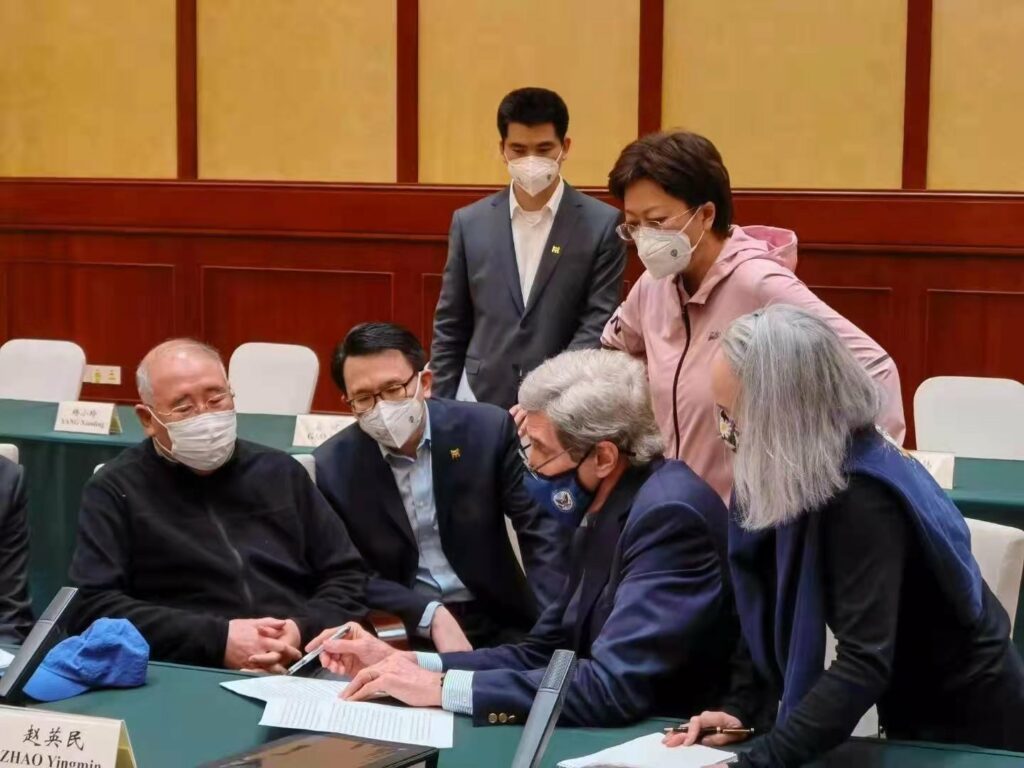The US and China have found common ground on climate. This is a challenge which transcends politics and has great geopolitical significance. Confronted with an existential and global threat, there is no alternative to collaboration.
John Kerry is deeply convinced of this, as some of his recent statements make clear. We need “a wartime mentality” to save the planet’s climate (June 28, 2021); “Simply, if we don’t cooperate (with China) we are dead” (June 29, 2021). “The time left is very short”, the crisis is “unfolding faster and more violently” than expected. “In World War two and its aftermath, leaders did what they had to do”; even allying with the Soviets. (July 20, 2021).
I had written this much in September, commenting on John Kerry’s successful visit to China, which effectively set the basis for yesterday’s agreement.
“The US and China seek a common position for COP26 and hope to replicate the model for cooperation, created and tested by John Kerry and Xie Zhenhua themselves, which contributed to the success of Paris. At the foundation of this playbook lies the “US-China Climate Change Working Group” set up in 2013 and which also remained in operation with Trump.”
And indeed, the breakthrough U.S.-China Joint Glasgow Declaration announces that “The two sides intend to establish a “Working Group on Enhancing Climate Action in the 2020s”.
This was in my mind the only way forward, as I had mentioned during a web talk with Todd Stern, John Podesta and Mauro Petriccione, organised by Formiche in January this year.
Compared to 2015, the international situation has clearly deteriorated. Growing geopolitical tensions and the confrontation between the United States and China – according to some – mark the entry into a Cold War. Many in Washington fear that the energy transition will weaken the US to the advantage of Beijing.
The sheer dimension and the innovational capability of the Chinese industrial system arouse concern. Renewable energy capacity which has been installed in China in 2020 amounts to 33% of the world’s total. Yet, far from being a threat, the rapid development of Chinese renewable capacity has helped to cut costs for the benefit of the rest of the world. Electricity produced by solar is today the cheapest in history (IRENA). Prices of photovoltaic modules have fallen by 89% since 2010. Solar photovoltaic prices are forecast to drop by another 34% by 2030. By 2050, those prices are expected to drop by a total of 63%. This means utility-scale PV will cost only 2.5 cents per kWh. It is now cheaper to build and operate new large-scale wind or solar plants in nearly half the world than it would be to run an existing coal or gas-fired power plant in countries that represent 46% of the world’s population. “The benefits of the transition have never been clearer” (Francesco La Camera).
If there is an increase in energy prices in the short term (this is happening in Europe as we write), mainly due to the rising price of carbon, this is only an adjustment phase. They will decrease over time.
As Kerry noted, the Chinese see a contradiction between our requests to do more on climate while we raise sanctions on Chinese photovoltaic panels manufacturers.
The EU, which aims for a leadership role, sees Beijing as a necessary partner. The two blocs are converging in terms of environmental regulations and industrial standards. Those and pricing carbon are the best guarantee for a “level playing field” for European companies.
Cutting greenhouse gas emissions by half by 2030, as decided by the European Union or announced by President Biden, requires tough measures and a radical transformation of industrial and consumer systems. Changing the energy matrix means changing the structure of our societies and the way we live. It is not an abstract exercise in cutting greenhouse gas emissions.
The ecological transition has entered its hardest phase. After thirty years of incremental adjustments and excruciating delays by politics and industry, the largely still only declared goals of climate neutrality imply a clear departure from past policies.
In the old Italian concession of Tianjin, the old world was dying, while the new struggles to be born. It might have been the time of monsters. Instead, we seem to be ready to fight them back.







